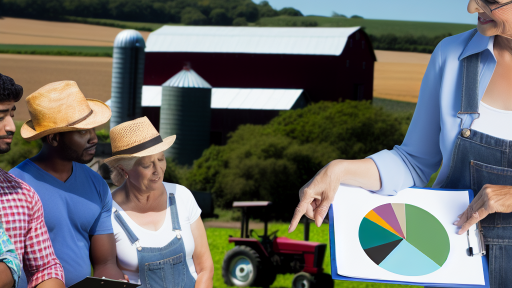Introduction to Zoning Regulations in Agriculture
Zoning regulations play a crucial role in agricultural development.
They guide land use and dictate what activities can occur in certain areas.
Farmers and landowners must understand these rules to comply effectively.
Each locality may have its own set of zoning laws.
Therefore, it is essential to consult local government offices for accurate information.
Importance of Understanding Zoning Regulations
Understanding zoning regulations helps protect agricultural land.
They prevent incompatible developments from encroaching on farming areas.
Moreover, these regulations can enhance community planning efforts.
Land use planning often promotes environmental conservation and sustainability.
Failing to adhere to zoning laws can result in legal penalties.
Types of Zoning Regulations
There are various types of zoning regulations affecting agriculture.
Each type serves a distinct purpose in managing land use.
- Farmland Protection Zoning: safeguards agricultural land from urban development.
- Conservation Zoning: promotes environmental preservation, particularly for sensitive areas.
- Commercial Agricultural Zoning: allows for agricultural-related business activities.
Navigating Local Zoning Laws
Farmers must navigate local zoning laws carefully.
This process often involves reviewing local ordinances.
Attending community meetings can provide insight into proposed changes.
Transform Your Agribusiness
Unlock your farm's potential with expert advice tailored to your needs. Get actionable steps that drive real results.
Get StartedMoreover, local extension offices offer resources and guidance.
Hiring a land-use attorney can also be beneficial for complex situations.
Impact of Zoning Regulations on Agricultural Practices
Zoning regulations significantly impact agricultural practices.
For instance, they may limit the size of structures on farms.
Furthermore, regulations may dictate setbacks from property lines.
These restrictions can influence farm layout and operations.
Adjusting to these limitations is essential for farm viability.
Importance of Understanding Local Zoning Laws
Protecting Your Agricultural Investment
Understanding local zoning laws protects your agricultural investment.
Zoning controls land use and development in your area.
These regulations determine what you can or cannot do with your property.
Consequently, knowing these rules helps prevent costly mistakes.
Avoiding Legal Issues
Familiarity with local zoning regulations helps you avoid legal problems.
Violating zoning laws can result in fines and penalties.
Moreover, it may lead to forced compliance actions.
Being informed protects your rights as a land owner.
Enhancing Community Relations
Understanding zoning laws fosters positive community relations.
Engaging with local zoning guidelines shows your commitment to community standards.
This proactive approach builds trust with neighbors and local officials.
As a result, it may lead to more support for your agricultural endeavors.
Facilitating Planned Growth
Comprehending local zoning laws aids in planning for growth.
It allows you to identify suitable areas for expansions or new ventures.
Furthermore, it provides insights into potential changes in land use.
Being prepared for these changes enhances your business strategy.
Accessing Resources and Support
Knowledge of zoning laws helps in accessing resources and support.
Showcase Your Farming Business
Publish your professional farming services profile on our blog for a one-time fee of $200 and reach a dedicated audience of farmers and agribusiness owners.
Publish Your ProfileMany agricultural programs require compliance with local zoning regulations.
Consequently, understanding these laws positions you to take advantage of these programs.
Ultimately, it leads to better funding opportunities for your agricultural projects.
Common Types of Zoning Regulations Affecting Agriculture
Use Zoning
Use zoning specifies which activities can occur in designated areas.
This regulation protects agricultural land from incompatible uses.
For example, residential developments may be restricted near farms.
Farmers often benefit from understanding use zoning in their area.
Setback Regulations
Setback regulations determine how far structures must be from property lines.
These rules aim to ensure safety and privacy for neighboring properties.
Farmers must comply with setback requirements for buildings and fences.
Failing to meet these standards can lead to fines or legal issues.
Lot Density Restrictions
Lot density restrictions limit the number of structures on a given parcel of land.
These regulations help control urban sprawl and maintain rural character.
Farmers should be aware of these limits when planning new facilities.
Exceeding density limits can result in enforcement actions and penalties.
Environmental Zoning
Environmental zoning protects sensitive ecological areas from development.
This category includes wetlands, floodplains, and wildlife habitats.
Farmers may face restrictions on water usage and fertilizer application.
Understanding these regulations is crucial for sustainable farming practices.
Agricultural Zoning
Agricultural zoning specifically designates land for farming activities.
This zoning type supports agricultural enterprises by minimizing conflicts.
It often allows certain structures and machinery necessary for farming.
Farmers should leverage agricultural zoning for long-term growth.
Building Codes
Building codes establish safety standards for construction in agricultural areas.
Compliance protects farmers, workers, and the surrounding community.
Farm structures must meet local and state code requirements.
Regularly reviewing these codes can help avoid costly renovations.
Permitting Processes
Permitting processes govern how farmers can develop their land.
All new constructions often require permits before they can proceed.
Farmers must prepare to submit applications and plans for review.
Understanding the local permitting process can simplify development projects.
Find Out More: Navigating Farm Labor Standards
Steps to Research Zoning Regulations in Your Area
Identify Local Zoning Authorities
Begin by identifying the local authority responsible for zoning regulations.
Visit your city’s or county’s official website.
Contact local planning or zoning departments for detailed inquiries.
Be aware that different departments may oversee various regulations.
Gather Relevant Documentation
Request zoning maps for your area from local offices.
These maps provide essential information about land use designations.
Furthermore, obtain copies of current zoning bylaws and ordinances.
These documents outline specific regulations affecting agricultural land.
Showcase Your Farming Business
Publish your professional farming services profile on our blog for a one-time fee of $200 and reach a dedicated audience of farmers and agribusiness owners.
Publish Your ProfileUnderstand Zoning Classifications
Learn about the different zoning classifications that apply to agriculture.
Common classifications include agricultural, residential, and commercial zones.
Each classification has unique rules influencing farming activities.
Review the allowed uses and restrictions in your specific classification.
Research Recent Changes
Check for any recent amendments to zoning laws.
Changes can have significant implications for agricultural practices.
Attend public hearings or meetings where zoning matters are discussed.
These gatherings provide opportunities to voice concerns or gather insights.
Consult Legal Resources
Consider consulting with a zoning attorney or agricultural consultant.
Legal professionals can clarify complex regulations and provide guidance.
Moreover, they can assist in navigating any legal challenges you may encounter.
Engage with Local Community Groups
Connect with local agricultural organizations or community groups.
These groups often have insights into zoning regulations and challenges.
Participating in these organizations can foster support for agricultural needs.
Additionally, they may advocate for beneficial policy changes on your behalf.
Explore Further: Migrant Worker Protections in Agriculture
How to Apply for Zoning Variances or Permits
Understanding Zoning Laws
Familiarize yourself with local zoning regulations.
These regulations dictate land-use practices.
They also define what activities you can conduct on your property.
Consult your local government’s planning department for details.
They will provide essential guidance and documentation.
Preparing Your Application
Create a clear outline of your proposed project.
Define the purpose and goals of your application.
Gather relevant supporting documents to strengthen your case.
Required documents may include maps and drawings.
Include photographs of the site as well.
Submitting the Application
Adhere to the specific submission guidelines provided by the local authority.
Ensure that all documents are complete and accurate.
Pay any required application fees on time.
Submit the application by mail or in person, as directed.
Attending Public Hearings
Be prepared to attend public hearings regarding your application.
Present your project clearly and confidently.
Address any concerns raised by the community or officials.
Listening to feedback is essential for successful outcomes.
Receiving the Decision
Wait for the local zoning board to review your application.
They may take several weeks to reach a decision.
Be prepared for possible requests for additional information.
Once a decision is made, you’ll receive notification via mail.
Appealing a Decision
If your application is denied, review the reasons carefully.
Understand the appeals process outlined by local regulations.
Showcase Your Farming Business
Publish your professional farming services profile on our blog for a one-time fee of $200 and reach a dedicated audience of farmers and agribusiness owners.
Publish Your ProfilePrepare to submit an appeal with additional supportive information.
Gather testimonials or expert opinions to strengthen your case.
Stay persistent and proactive throughout the process.
You Might Also Like: Worker Rights in Agricultural Settings

Impact of Zoning on Agricultural Operations and Growth
Understanding Zoning Regulations
Zoning regulations significantly shape agricultural practices.
They dictate how land can be used for farming activities.
Moreover, these regulations vary by region and municipality.
Farmers must navigate these laws to optimize land use.
Comprehending local zoning is crucial for compliance and growth.
Influence on Farm Size and Structure
Zoning can affect the size of farming operations.
Restrictions may limit the number of livestock or crop types.
Consequently, farmers may need to adapt their business models.
Intensive zoning laws can lead to smaller farms.
As a result, some farmers may seek alternative locations.
Effects on Agricultural Expansion
Expansion opportunities are often contingent on zoning laws.
Farmers may face hurdles when trying to acquire additional land.
Incompatible zoning can hinder growth potential.
Farmers must engage with local governments to seek changes.
This process can be time-consuming and complex.
Environmental Considerations
Zoning regulations often aim to protect natural resources.
For instance, certain areas may be designated for conservation.
This affects where agricultural practices can occur.
However, these protections also benefit farming sustainability.
Farmers must balance compliance with ecological preservation.
Strategies for Compliance and Success
Staying informed is essential for navigating zoning regulations.
Farmers should participate in local planning meetings.
This engagement helps them understand upcoming changes.
Building relationships with local officials can also be beneficial.
Additionally, collaborating with agricultural organizations provides support.
Leveraging Technology and Innovation
Technology can assist farmers in complying with zoning laws.
For example, precision agriculture tools optimize land use.
Moreover, data analytics helps in understanding zoning impacts.
Farmers who embrace innovation enhance their operations.
This proactive approach leads to sustainable growth.
Explore Further: Biotechnology and GMO Rules for Sustainable Farming
Case Studies: Successful Navigation of Zoning Challenges
Farmstead Development in Maplevale
The Anderson family faced zoning restrictions while expanding their farmstead in Maplevale.
Initially, they struggled with the local zoning board’s regulations on farmland usage.
However, they conducted thorough research on zoning laws and agricultural permits.
With a clear understanding, they presented a detailed proposal for their expansion.
Their proposal included plans for crop rotations and sustainable practices.
Showcase Your Farming Business
Publish your professional farming services profile on our blog for a one-time fee of $200 and reach a dedicated audience of farmers and agribusiness owners.
Publish Your ProfileUltimately, the zoning board approved their request, paving the way for development.
Innovative Solutions in Green Valley
Green Valley Farms encountered significant challenges with livestock zoning regulations.
In response, the owners sought advice from local agricultural experts.
The experts recommended innovative solutions to meet health and safety standards.
Consequently, the owners implemented new fencing and waste management systems.
As a result, they successfully complied with the stricter zoning requirements.
The local community praised their efforts, enhancing the farm’s reputation.
Community Engagement in Riverside
The Riverside Farmers Collective faced opposition from residents regarding zoning changes.
To address concerns, they initiated a community engagement program.
They held meetings to inform residents about their sustainable practices.
Moreover, they solicited feedback to address community worries about noise and traffic.
This approach fostered trust and goodwill among local residents.
Eventually, the community supported the zoning changes, allowing for expansion.
Technology and Zoning in Brookfield
Brookfield Agriculture, Inc. faced zoning hurdles for a new greenhouse project.
The company adopted technology to demonstrate minimal environmental impact.
They utilized simulations to predict the potential effects on local ecosystems.
With data-driven evidence, they proposed advanced irrigation and heating systems.
The zoning board was impressed by their commitment to sustainability.
This ultimately led to the project being approved with minimal restrictions.
Lessons Learned
Each case highlights the importance of understanding local zoning laws.
Proactive engagement with authorities can lead to better outcomes.
Furthermore, community involvement fosters trust and support.
Incorporating technology can effectively address environmental concerns.
Ultimately, successful navigation of zoning challenges is achievable with dedication.
Resources and Tools for Farmers to Stay Informed on Zoning Changes
Online Databases
Farmers can access online databases for zoning information.
These databases often provide real-time updates on changes.
For example, the USDA offers a comprehensive resource for agricultural zoning.
Additionally, many state agricultural departments maintain updated information.
Local Agricultural Extension Services
Local extension services are crucial for staying informed.
These services often host workshops and seminars on zoning regulations.
Farmers can reach out to county extension agents for specific inquiries.
Moreover, they provide tailored advice for local zoning issues.
Networking with Fellow Farmers
Building a network with other farmers can be beneficial.
Joining local farming organizations helps share zoning insights.
Participating in community meetings allows farmers to discuss concerns.
Furthermore, farmers can exchange resources and tools to stay updated.
Government Agencies and Their Resources
Engaging with local government agencies is essential.
Farmers can subscribe to newsletters from zoning boards.
Following their social media pages is another effective way to get updates.
Additionally, many municipalities have websites dedicated to zoning issues.
Showcase Your Farming Business
Publish your professional farming services profile on our blog for a one-time fee of $200 and reach a dedicated audience of farmers and agribusiness owners.
Publish Your ProfileWorkshops and Information Sessions
Attending workshops on zoning regulations offers valuable information.
These workshops typically cover recent changes and implications for farmers.
Moreover, they provide insights on navigating compliance challenges.
Some local universities may also sponsor informative sessions.
Online Forums and Social Media Groups
Online forums can be valuable for discussions about zoning regulations.
Farmers can join specific agriculture-related groups on social media.
These platforms facilitate sharing experiences and resources among farmers.
Additionally, they can help to raise awareness on recent zoning issues.




